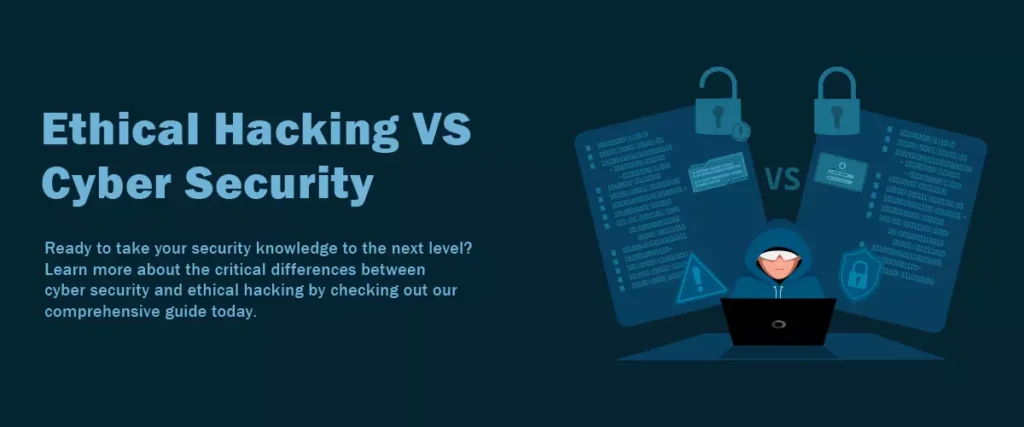Cybersecurity vs Ethical Hacking: What’s the Difference?
In today’s digital-first world, cyber threats are multiplying, and so is the need for experts who can protect sensitive information.
Two terms that often come up are Cybersecurity and Ethical Hacking. While both play crucial roles in digital defence, they are not the same. If you are planning a career in IT security or simply want to understand how the online world is safeguarded, it’s important to know the difference between these two fields.
This article explores the differences between Cybersecurity and Ethical Hacking, including their definitions, responsibilities, required skills, and how they differ—helping you make an informed choice. know more

Table of Contents
What is Cybersecurity?
Cybersecurity refers to the practice of protecting systems, networks, and data from cyberattacks. It is a broad field that covers multiple aspects of digital security including:
Network Security – Safeguarding internal networks from unauthorized access.
Application Security – Securing apps and software from vulnerabilities.
Cloud Security – Protecting cloud-based platforms and services.
Data Security – Ensuring sensitive information is encrypted and backed up.
Incident Response – Handling and recovering from security breaches.
A cybersecurity professional’s job is preventive. They focus on building strong defense mechanisms to stop hackers before they cause damage.
What is Ethical Hacking?
Ethical Hacking, on the other hand, is a specialised branch of cybersecurity. Ethical hackers, also known as white-hat hackers, legally break into systems to test their security. Unlike malicious hackers, their goal is to find vulnerabilities before criminals exploit them.
Ethical hacking involves:
Penetration Testing – Simulating real-world cyberattacks to expose weaknesses.
Vulnerability Assessment – Identifying and documenting security flaws.
Social Engineering Tests – Checking if employees can be tricked into revealing information.
Exploiting Weak Points – Demonstrating how hackers can gain unauthorized access.
In short, ethical hacking is offensive security, while cybersecurity is defensive security. Both are equally important for overall digital safety.
Key Differences Between Cybersecurity and Ethical Hacking
| Aspect | Cybersecurity | Ethical Hacking |
|---|---|---|
| Focus | Preventing attacks through security measures | Identifying vulnerabilities via controlled attacks |
| Approach | Defensive | Offensive |
| Goal | Build protection systems | Test and strengthen security systems |
| Role | Security Analyst, SOC Engineer, Security Architect | Penetration Tester, Red Team Specialist, Security Consultant |
| Tools Used | Firewalls, Antivirus, IDS/IPS, SIEM Tools | Kali Linux, Metasploit, Burp Suite, Nmap |
| End Users | Businesses, Government, Individuals | Businesses, Security Teams, Organizations |
Skills Required in Each Field
Cybersecurity Professionals
Knowledge of network protocols and firewalls
Skills in data encryption and access control
Understanding of compliance and regulations
Expertise in incident response and risk management
Ethical Hackers
Strong knowledge of programming and scripting
Mastery of penetration testing tools
Problem-solving mindset to think like a hacker
Ability to conduct red team vs blue team exercises
Why Both Are Important
Organisations cannot rely only on cybersecurity defences or only on ethical hacking. Cybersecurity creates a shield, while ethical hacking tests the shield. Without one, the other is incomplete.
For example:
Cybersecurity teams may install advanced firewalls.
Ethical hackers will test if those firewalls can be bypassed.
Together, they create a robust cyber defense strategy.
Career Opportunities
The demand for both fields is skyrocketing. According to recent reports, cybersecurity job roles are expected to grow by more than 30% in the next decade.
Cybersecurity Careers: Security Analyst, SOC Engineer, Cryptographer, Security Architect.
Ethical Hacking Careers: Penetration Tester, Red Team Expert, Vulnerability Assessor, Bug Bounty Hunter.
If you love building strong defense systems, cybersecurity is a great career. If you enjoy breaking into systems (legally) to expose flaws, ethical hacking is your path.
Which Should You Choose?
Choosing between Cybersecurity vs Ethical Hacking depends on your interest:
Prefer preventing cybercrime → Choose Cybersecurity.
Prefer finding loopholes and testing systems → Choose Ethical Hacking.
Both offer excellent salaries, global opportunities, and exciting challenges.
FAQs on Cybersecurity vs Ethical Hacking
No. Cybersecurity focuses on defense, while ethical hacking focuses on offense.
Yes. Ethical hacking is part of cybersecurity. Many professionals switch between roles.
Both fields have high demand, but cybersecurity covers a broader scope.
Basic programming helps, but ethical hacking requires more coding expertise.
Yes, if done with permission and within laws. It becomes illegal without consent.
Kali Linux, Metasploit, Nmap, and Burp Suite are popular tools.
Both are well-paid, but ethical hackers with specialized skills often earn higher.
It’s better to start with cybersecurity basics before moving into ethical hacking.
Cybersecurity: CompTIA Security+, CISSP, CISM.
Ethical Hacking: CEH (Certified Ethical Hacker), OSCP.
Both are essential as cyber threats grow. Combining both skills gives you a competitive edge.
The debate of Cybersecurity vs Ethical Hacking is not about which is better, but about how they complement each other. Cybersecurity lays the foundation for defence, while ethical hacking ensures those defences are foolproof.
Whether you want to become a cyber defender or a white-hat hacker, both paths guarantee a future-proof career in the digital world.